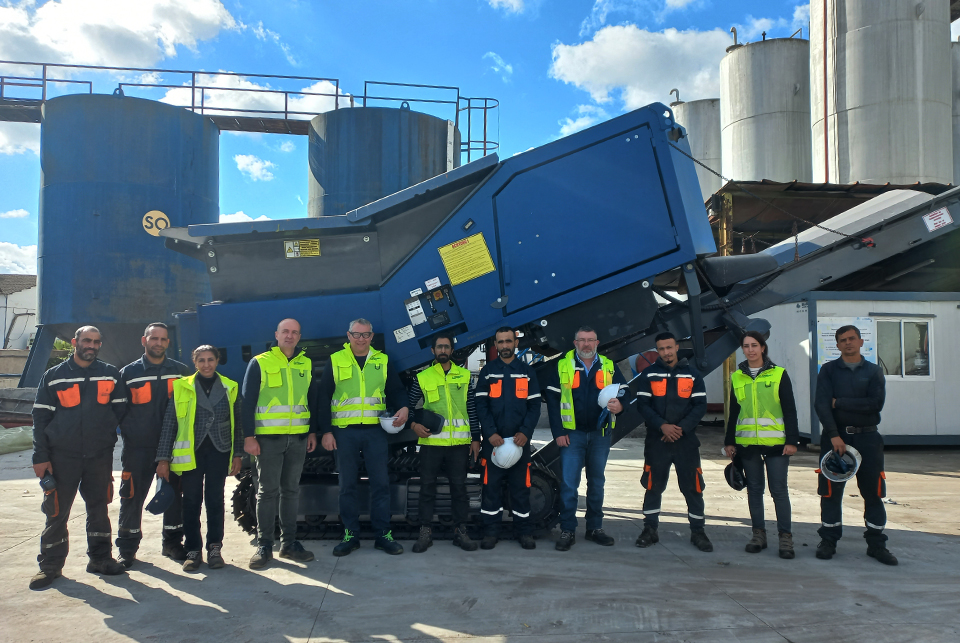CHIMIREC Morocco: The rise of RDF

For several years CHIMIREC Morocco has been producing Refuse Derived Fuel (RDF) from the waste it collects. An alternative to fossil fuels, this fuel is highly prized by the cement industry. To support the dynamic development of its Moroccan subsidiary, the CHIMIREC Group has just invested in a new production facility to increase RDF manufacturing capacity.
With over sixty years' experience in the management of hazardous waste, the CHIMIREC Group committed itself early on to a sustainable development approach, giving priority to material or energy recovery from the waste it collects.
Today, the Group has ten internal recovery processes, including Refuse Derived Fuel, which was set up in 2013 at its CHIMIREC Javené (35) site in France. The CHIMIREC Group then deployed several production units of the same type, at the CHIMIREC Socodeli Beaucaire (30) site and at its international subsidiary in Turkey and Morocco.
Refuse Derived Fuel is made from hazardous waste: paint residues, industrial sludge, hydrocarbons, adhesives and sealants, packaging and soiled materials, and filter materials from oil filters.
RDF's environmental benefits
- 100% recovery of waste, avoiding its storage and burial.
- High calorific value, making it possible to replace fossil fuels (coal, oil, gas) in industries authorised to do so. Currently, these are mainly cement manufacturers and a few lime kilns.
- Decarbonation of industry, a major challenge for the energy transition.
- Increased energy independence, in a geopolitical context whose harmful effects we have been able to measure.
In Morocco, a buoyant and promising market
Since setting up in Kenitra in January 2020, CHIMIREC Morocco has distinguished itself in the waste management market through its professionalism and compliance with regulations. These values, upheld by the CHIMIREC Group, are perfectly in line with the evolution of Moroccan legislation in favour of environmental protection, traceability, and the virtuous treatment of waste.
At the same time, local demand for Refuse Derived Fuel is growing steadily. And CHIMIREC Morocco is already in contact with three local cement manufacturers, with other contacts in progress.
Since taking up his post in February, Fabien Molinier, Director of CHIMIREC Morocco, has given his team a new impetus for development. His twenty years' experience in Moroccan industry is an undeniable asset for the expansion of CHIMIREC Morocco.
A new shredder with a significant increase in capacity
Whereas the old shredder handled one tonne of waste per hour, the new shredder installed at the CHIMIREC Morocco site has a capacity of three to five tonnes per hour.
Its installation involved adapting and reinforcing the existing structure, as well as extending the waste storage area. In fact, CHIMIREC Morocco must be configured to triple the volume of waste received on its site soon.
Safety measures for people and the plant have been adapted to meet the requirements of this new production facility and the increased rate of production. The teams have also been trained in the use of this new shredder and the associated safety measures.
Teams from CHIMIREC Javené, RDF's historical production unit, supported
CHIMIREC Morocco throughout all the stages of this development. Before being shipped to Kenitra, the shredder was tested by them in France. CHIMIREC Javené's maintenance manager and the director of treatment facilities were also on hand for the commissioning of this new production tool.
In France and abroad, the Group spirit is alive and well at CHIMIREC!
CHIMIREC GROUP I RDF production :
>in France at the CHIMIREC Javené (35) and CHIMIREC Socodeli Beaucaire (30) subsidiaries. Around 30,000 tonnes/year of RDF waste in 2022.
> abroad, CHIMIREC Avrasya in Turkey (50,600 tonnes/year of waste recovered as RDF) and CHIMIREC Morocco, targeting to produce 4,000 to 6,000 tonnes of RDF in 2024.
Published : 2024-03-20

